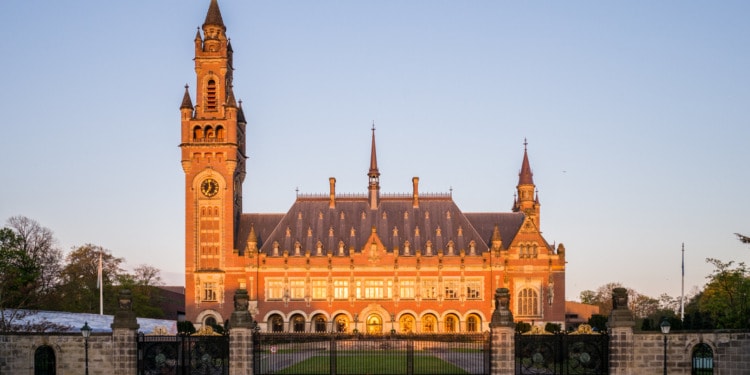On Monday night, a bill proposing to alter the terms of the Brexit deal between the United Kingdom and Northern Ireland passed through the second reading stage in the House of Commons despite warnings that it could lead to a trade war.
The bill, if passed, would grant British prime ministers power to ignore parts of the Northern Ireland protocol which prevented a land border between Northern Irland (non-EU) and the Republic of Ireland (EU member) — something that was an essential part of the Brexit “divorce” deal from the UK.
During second readings, voting sided 295 to 221 in favor of ripping apart the Brexit deal, which was just passed in 2021, in order to alter trade agreements between Northern Ireland and the rest of the UK.
Despite agreement in the House of Commons, disagreement over the change is apparent with the European Union as well as former UK Prime Minister Theresa May claiming the move is illegal.
Apart from describing it as a breach of international law, May warned the bill would “diminish the standing of the United Kingdom in the eyes of the world.”
What is the Northern Ireland Protocol?
The Northern Ireland Protocol was established after the Brexit withdrawal agreement was signed in January 2020, with ”Brexit” referring to the UK’s exit from the European Union, which includes England, Scotland, Wales and Northern Ireland.
The protocol came into force at the beginning of 2021 and, as BBC points out, has been a “source of tension” ever since.
Prior to Brexit, goods were easily traded between the Republic of Ireland, Northern Ireland and the rest of the UK as all of these countries fell under the same EU trade rules. Yet after Brexit, a new set of trade rules was required as the EU has strict food regulations and requires border checks when certain goods — particularly milk and eggs — come from non-EU countries.
Aiming to avoid a hard border between Northern Ireland and the Republic of Ireland following Brexit, the EU and the UK established and signed the Northern Ireland Protocol, which is now part of international law.
The protocol ensured there would be no new checks on goods crossing the border between Northern Ireland and the Republic of Ireland, allowing Northern Ireland to remain in the EU’s single market for goods under the condition that it carries out checks on goods coming into Northern Ireland from the rest of the UK to make sure Northern Ireland continues to abide by EU rules and regulations on product standards.
Other UK nations, England, Scotland and Wales, left the EU’s single market for goods following Brexit and no longer have to follow the EU’s product standard rules and regulations.
What does the UK want to change about the bill?
The UK’s proposed new bill would essentially give ministers the power to “switch off” some parts of the Northern Ireland Protocol and change the way certain goods are transported from the UK to Northern Ireland to make the process “easier.”
Yet changing the way goods flow into Northern Ireland from the UK also implies changing the way they enter the EU’s single market for goods — which has different rules and regulations on product standards than the UK.
It also means changing the way goods enter the EU given that there are no border checks on goods between Northern Ireland and the Republic of Ireland, an EU member state.
Right now, the Northern Ireland Protocol ensures that certain goods are checked before entering Northern Ireland from the UK, regardless of their final destination (which could either be Northern Ireland or the Republic of Ireland, and therefore the EU).
Once the goods have been checked upon entering Northern Ireland, under the protocol they can then freely move to the Republic of Ireland or further into the EU.
The UK’s new bill is now suggesting different procedures for goods depending on their final destination: goods being exported from the UK to Northern Ireland would follow one procedure, while those entering Northern Ireland from the UK on their way to the Republic of Ireland and the EU would follow another.
Specifically, it is proposing that goods destined for Northern Ireland only do not undergo any checks whatsoever when entering Northern Ireland from the UK while the goods destined for the Republic of Ireland and the EU, which likewise have to enter Northern Ireland from the UK before moving to Ireland, would have to be checked before entering Northern Ireland.
This, as the bill proposes, would be facilitated through the development of red and green lanes for goods imported from Britain into Northern Ireland:
- Goods moving from the UK into Northern Ireland as their final destination would go into the green lane and would not undergo border checks.
- Goods destined for the Republic of Ireland and the EU would go into the red lane and would undergo full border checks and custom controls.
Essentially, the UK is proposing exporting goods to the EU’s single market (through Northern Ireland) without the goods undergoing border checks or custom controls – which would be a violation of EU trade law.
The UK also wants to change other aspects of trade including tax rules. At the moment, Northern Ireland follows EU rules on state aid and VAT. Under these rules, Northern Ireland recieves government payments from the EU to help firms in the country as well as obains tax breaks set within the limits of EU standards. The UK now wants to remove these limits.
Alongside different tax rules, the UK’s new bill proposed an independent body should settle disputes over the Northern Ireland Protocol instead of the European Court of Justice.
In essence, it appears the UK is tired of abiding by EU standards and wants to clip one of the last remaining cords that ties them together.
Unionist parties within Northern Ireland agree with the change
The majority of unions in Northern Ireland agree with the move to be part of the UK rather than to abide by EU trade laws.
As of now, Northern Ireland’s biggest unionist party, the Democratic Unionists (DUP), is actually refusing to take part in the Northern Ireland Protocol until the concerns they have are addressed by the EU.
Despite the DUP loss in Northern Ireland’s May election to Sinn Fein — a nationalist party that agrees with the protocol — the support of the DUP is essential to the formation of a new Northern Ireland government.
The DUP and others are justifying that the move to abandon the Northern Ireland protocol is legal because it “safeguards an essential interest” — the peace of Ireland.
The EU believes the move is illegal
On June 15, the European Commission took legal action against the UK for not abiding by the Northern Ireland Protocol, calling on the British government to return to the normal negotiations.
Most recently, the EU has stated that it is not willing to renegotiate the entire protocol but has offered to work on how the rules apply.
Some of the improvements the EU has mentioned include:
- Reducing customs and checks on goods
- Reducing the amount of paperwork
- Relaxing rules on chilled meats so they can be sent across the Irish Sea
Despite agreeing to alter the protocol in the future, the EU does not want to open discussion now while the UK is pressing for negotiations.
Many are saying the move to change protocol is illegal as it alters international law, one of these individuals being David Lammy, shadow foreign secretary of the United Kingdom.
“This bill is damaging and counterproductive,” Lammy said. ”The strategy behind it is flawed. The legal justification for it is feeble. The precedent it sets is dangerous, and the timing could hardly be worse. It divides the United Kingdom and the European Union.”
Yet others including foreign secretary Liz Truss are claiming the changes were “legal and necessary.”
Opening the debate on Monday, Truss mentioned there was a “strong legal justification” for the change and the UK would continue to push negotiations despite pushback from the EU.
A remarkable ten minutes of @mrjamesob radio, where @ProfMarkElliott demolishes the Johnson/Truss move to disregard the Northern Ireland Protocol. Really worth listening to.
pic.twitter.com/myqe2qHlTm— John O’Brennan (@JohnOBrennan2) June 28, 2022
Northern Ireland’s secretary Brandon Lewis stated the bill was designed to guarantee the same free flow of goods from Northern Ireland to Great Britain similar to Great Yarmouth to Carlisle (referring to the trade between UK cities).
As many are now warning, failure to come to an agreement could lead to a trade war between the UK and the EU, which — given the current multi-crises around the world — could hardly come at a worse time. It is therefore imperative that an agreement is reached before the present crises are deepened unnecessarily by a new one.
Editor’s Note: The opinions expressed here by Impakter.com columnists are their own, not those of Impakter.com. — In the Featured Photo: International Court of Justice in the Hague, Netherlands on April 19, 2020. Source: R Boed, Flickr.









